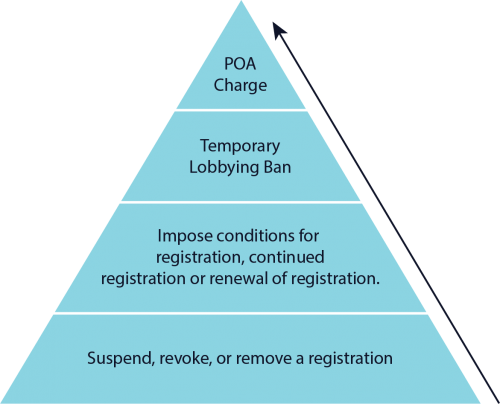

The Registrar conducts inquiries into matters relating to compliance with the registry and the Lobbyists’ Code of Conduct.
A request for an inquiry about compliance with the registry system or Lobbyists’ Code of Conduct may be made by City Council, a member of Council or a member of the public, including the Registrar.
The Toronto Lobbyist Registrar is responsible for the administration and oversight of the Lobbyist Registry By-law.
Where there are issues of non-compliance, the Lobbying By-law gives the Lobbyist Registrar the following range of enforcement powers:
The refusal to accept, and the ability to suspend, revoke, or remove a registration, when a registration fails to comply with the requirements of the by-law or where the lobbyist fails to provide required or requested information.
The power, on finding a breach of the Lobbying By-law, to impose conditions for registration, continued registration or renewal of registration.
The power, on finding a breach of the Lobbying By-law, to impose a temporary ban on lobbying for breaches of the Lobbying By-law based on an escalating scale, in accordance with the following scheme:
*Please note, multiple breaches arising out of the same inquiry may result in the Lobbyist Registrar imposing a ban at step two or three of the scale.
The Lobbyist Registrar can also prosecute breaches of the Lobbying By-law under the Provincial Offences Act (POA). Every person convicted of an offence under the Lobbying By-law is liable on a first conviction to a fine of not more than $25,000 and on each subsequent conviction to a fine of not more than $100,000.

The escalating approach to non-compliance is depicted in Figure 1.
Revised on March 27, 2013
The Registrar conducts inquiries into matters relating to compliance with the registry and the Lobbyists’ Code of Conduct in private, unless:
The Registrar may refuse to inquire into a request where, in the Registrar’s opinion, one or more of the following circumstances exist:
If, on its face, the request concerns an allegation of a criminal nature consistent with the Criminal Code of Canada or an offence under any other Act, the requester shall be advised that if the requester wishes to pursue the allegation, the requester must pursue it with the appropriate police force or other authority.
As required by section 169(7) of the City of Toronto Act, 2006, if at any time during the inquiry the Registrar determines that there are reasonable grounds to believe that there has been a contravention of any other Act or of the Criminal Code of Canada, the Registrar shall immediately refer the matter to the appropriate authorities and suspend the inquiry until any resulting police investigation and charge have been finally disposed of, and shall report the suspension to City Council.
Upon completion of an inquiry and prior to making a final report, the Registrar may provide the proposed findings and sanctions to the respondent, together with an opportunity to respond either in person or in writing on the proposed findings and any recommended sanctions.